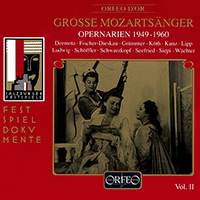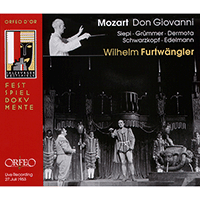Elisabeth Grümmer
After World War I, the territory of Alsace-Lorraine reverted to France, and German residents were obliged to leave. Grümmer and her family (whose name was Schilz) moved in 1919 to Meiningen, where she enrolled in the town’s drama school and performed Klärchen in Goethe’s Egmont in a student production. The idea of a stage career seemed over with marriage to violinist Detlev Grümmer (concertmaster at the Meiningen Landestheater) and motherhood; but when her husband was engaged as concertmaster at the Municipal Theatre in Aachen, where the General Music Director was Herbert von Karajan, Grümmer decided to take singing lessons with, amongst others, the distinguished vocal coach Franziska Martienssen-Lohmann. Karajan showed great interest, engaging her to sing the First Flower Maid / Parsifal in 1940: her first major role at Aachen was Octavian / Der Rosenkavalier (1941).
Between 1942 and 1944 Grümmer was a principal lyric soprano at the Duisberg Opera, after which she worked at the German Theatre in Prague. After the war, in 1946 she began a long association with the Städtische Oper, Berlin (later known as the Deutsche Oper), serving as a member of this company until 1972. Her repertoire was not large and concentrated upon the major lyric soprano roles, including the Countesses of Mozart (Le nozze di Figaro) and Richard Strauss (Capriccio); Pamina / Die Zauberflöte, Euridice / Orfeo ed Euridice (Gluck), Ilia / Idomeneo, Elsa / Lohengrin, Eva / Die Meistersinger von Nürnberg and Desdemona / Otello, as well as Ellen Orford in the first German production of Britten’s Peter Grimes (1947, Berlin).
Soon Grümmer established an international presence, singing Eva at the Royal Opera House, London in 1951 with Beecham and at La Scala, Milan in 1952 with Furtwängler. From 1953 onwards she was a frequent guest at the Vienna State Opera and made her debut at the Salzburg Festival in the same year: her roles there included Donna Anna / Don Giovanni (1953–1954, 1956), Agathe / Der Freischütz (1954), Pamina (1955–1956) and Electra / Idomeneo (1961–1962), as well as numerous concert appearances. She participated in the Bayreuth Festival as Eva (1957–1961), Elsa (1957–1958), and Freia and Gutrune / Der Ring des Nibelungen (1957–1958).
At the Glyndebourne Festival Grümmer sang Ilia and Countess Almaviva in 1956, while in 1967 she appeared as Elsa with the Metropolitan Opera and the Marschallin / Der Rosenkavalier with the New York City Opera. She also sang with the opera companies of Hamburg and Munich, as well as at the Paris Opera, the Théâtre de la Monnaie in Brussels and the Teatro Colón, Buenos Aires.
Grümmer’s husband was killed in 1944 in a bombing raid during the war, but she never remarried. Her farewell performance was given in Berlin in 1972 as the Marschallin. She had been appointed a professor at the Berlin High School for Music in 1965 and was made an honorary member of the Deutsche Oper in 1986, the year of her death.
Grümmer was one of a number of outstanding sopranos who flourished after World War II, others being Lisa della Casa, Sena Jurinac, Elisabeth Schwarzkopf and Irmgard Seefried. It may be that this, together with Grümmer’s particular repertoire, accounts for her limited representation on record. Nonetheless in the roles she made her own, such as Elsa and Agathe, she was especially outstanding: her stillness and concentration of expression serving the music superbly. The same may also be said for her performances in concert and recital.
© Naxos Rights International Ltd. — David Patmore (A–Z of Singers, Naxos 8.558097-100).






















